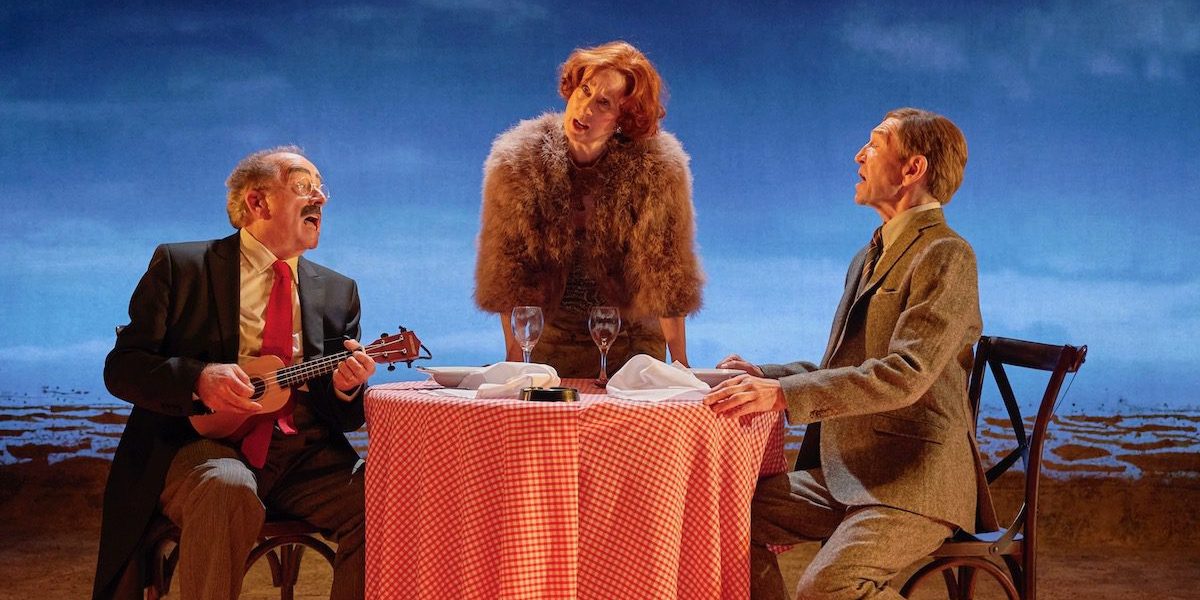Dinner with Groucho is a kind of one-act fantasia on the historic fact that T S Eliot and Groucho Marx were pen pals who met once late in their lives to dine together when Groucho came to London. There was a lot in the mentality of each that made them oddly compatible. Eliot loved vaudeville and saw the wit and wisdom in what a lot of other people found low brow; while Groucho was, in fact, superbly sensitive to words and puns and had a laser beam ability to spot and satirise everything he perceived as the ridiculous in life, art and politics. They were intellectually well-matched and something of that playfulness between them comes through in this entertainment.
The dinner party shown in the play is not, of course, the actual party that happened. It is an Absurdist dream and it introduces as the only other character a woman running the restaurant to which Eliot has taken Groucho. The set-up has something of a Samuel Becket feeling. The play itself is episodic and its development is not straightforward. It’s the invented character of the Proprietor, played by Ingrid Craigie as if she were a character written by T S Eliot that gives the play some of its glue, holds it together. At one point she is even a puppeteer manipulating the movements of the two men.
Greg Hicks does an admirable job in acting the part of T S Eliot, conveying the patrician scorn, the surprising wit, the somewhat uptight nature of the man – though this is late in his life and though he is much softened and more self-analytical, he also seems to be somewhat disappointed in his life. (I always remember Virginia Woolf referring to Eliot as turning up for tea wearing his fourpiece suit.) There is also a considered reference to Eliot’s now troubling and even notorious anti-Semitism and a well-written exchange on the subject with Groucho. Ian Bartholomew captures a lot of the anarchic satire and angst of Groucho, right down to the walk and the dancing eyebrows.
There is a lot to enjoy and ponder in the evening such as the nifty outbreaks of vaudeville song and dance, including a rendering of the legendary Marie Lloyd’s The Boy I love is Up in the Gallery. I enjoyed all the references to Groucho’s films and Eliot’s poems, many of them subtle. Many people have found the show very entertaining and hilarious. And yet, and yet, somehow for me the evening was interesting but not really engaging. That said, I’m certainly driven back to re-reading not only Eliot poems, but also his plays and his essays. I also now want to see again Duck Soup, A Night at the Opera, and A Day at the Races and probably also Horse Feathers, Go West and A Night in Casablanca.
The set design by Adam Wiltshire is striking and works well with this approach. I even wondered at one point if the play was carrying a kind of lighter Sartre reference too – Huis Clos, anyone? and the direction by Loveday Ingram is exemplary in its pacing and also the interpolations of vaudeville shticks choreographed by David Bolger. (Any relation to Ray?).
I found the play intellectually amusing and even stimulating. I enjoyed the concept. But I also kept wondering if the Proprietor could have referenced either Margaret Dumont or Kitty Carlisle as a character. That said, I give high Marx to all involved, especially to the writer Frank McGuinness for his perception that this real-life encounter would make a good subject. I guess I’m just not one hundred percent convinced by the execution; but I know that I’m in a minority in this. The banter provided in the script was often very classy and I too, like Eliot, am curious about what Greta Garbo was really like.

